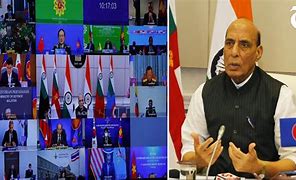NEW DELHI: Without naming China, India on Wednesday once again said it stood for a rule-based order in the Indo-Pacific based upon respect for sovereignty and territorial integrity of nations, peaceful resolution of disputes through dialogue and adherence to international rules and laws.
Defence Minister Rajnath Singh, speaking at the eighth ASEAN Defence Ministers’ plus meeting (ADMM-Plus) said: “India calls for a free, open and inclusive order in the Indo-Pacific.”
The ASEAN (Association of Southeast Asian Nations) is a group of 10 countries and five of those nations — Brunei, Malaysia, the Philippines, Taiwan and Vietnam – are locked in a dispute with China over claims in the hydro-carbon rich South China Sea.
China has created several man-made islands to extend its claims at the sea.
Rajnath Singh addressed the ADMM-plus meeting virtually.
With regards to developments in the South China Sea, he said it has attracted attention in the region and beyond. “India supports freedom of navigation, over flight and unimpeded commerce in these international waterways,” he said.
He hoped that the Code of Conduct negotiations will lead to outcomes that are in keeping with international law, including the UNCLOS (United Nations Convention on the Law of the Sea) and do not prejudice the legitimate rights and interests of nations that were not party to these discussions.
A few years ago, China lost its case on claims at a hearing under the UNCLOS, it did not accept the verdict and forced other parties to the dispute to enter into negotiations.
He said the maritime security challenges were another area of concern to India.
The Sea lanes of Communication were critical for peace, stability, prosperity and development of the Indo-Pacific region.
He said: “India has strengthened cooperative engagements in the Indo-Pacific based on converging visions and values for promotion of peace, stability, and prosperity in the region.”
The centrality of ASEAN and utilisation of ASEAN-led mechanisms are important platforms for implementation of our shared vision for the Indo-Pacific, he added.


